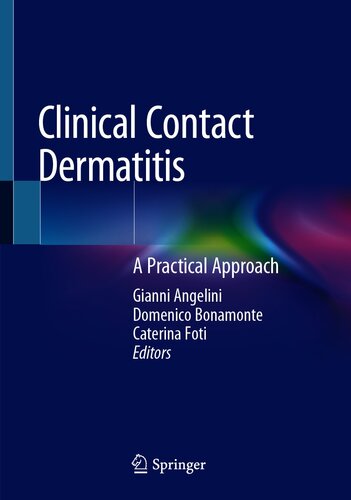

Most ebook files are in PDF format, so you can easily read them using various software such as Foxit Reader or directly on the Google Chrome browser.
Some ebook files are released by publishers in other formats such as .awz, .mobi, .epub, .fb2, etc. You may need to install specific software to read these formats on mobile/PC, such as Calibre.
Please read the tutorial at this link: https://ebookbell.com/faq
We offer FREE conversion to the popular formats you request; however, this may take some time. Therefore, right after payment, please email us, and we will try to provide the service as quickly as possible.
For some exceptional file formats or broken links (if any), please refrain from opening any disputes. Instead, email us first, and we will try to assist within a maximum of 6 hours.
EbookBell Team

4.8
104 reviewsThis book is intended as a manual and offers an essential tool for practicing and occupational dermatologists, for postgraduates training in dermatology and allergo-immunology, and for allergologists and occupational physicians. Moreover, the authors include information from the world literature, addressing the needs of those who work in industrial fields and are concerned about the dermatological safety of products. The book provides a handy update on this complex, rapidly evolving research area, and in particular, an in-depth analysis of its clinical aspects. It will enable dermatologists to recognize the various clinical manifestations of the condition, make a prompt diagnosis and choose the most effective treatment.
Contact dermatitis, a vast and fascinating field of study, has a high frequency of occurrence worldwide in both children and adults of both sexes, and during their daily routine, dermatologists invariably encounter many patients with this disease. To ensure the proper management of these patients it is necessary first of all to formulate a clinical diagnosis on accurate morphological grounds, since it is the most clinically polymorphic disease in dermatology and hence very demanding in terms of differential diagnosis. Then, to achieve properly targeted prevention for each patient, it is essential to isolate the causes among the numerous etiological chemical agents present in both working and leisure time activities and environments. The aim of this book is therefore two-fold: firstly to provide information on the various clinical features of contact dermatitis and review their differential diagnosis, and secondly to provide a comprehensive etiological overview.
Particular attention has been paid to the methodologies and importance of patch tests and other diagnostic tools, as well as to the principles of prognosis, treatment and rehabilitation, together with considerations on some preventive aspects underlying contact dermati